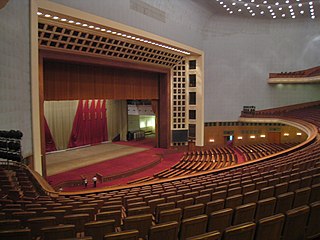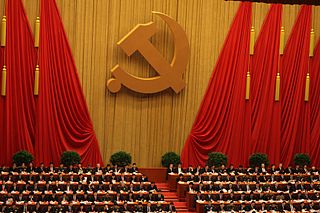
The Politburo of the Chinese Communist Party, officially the Political Bureau of the Central Committee of the Communist Party of China, is the highest political body of the Central Committee of the Chinese Communist Party.

The Politburo Standing Committee (PSC), officially the Standing Committee of the Political Bureau of the Central Committee of the Communist Party of China, is a committee consisting of the top leadership of the Chinese Communist Party (CCP). Historically it has been composed of five to eleven members, and currently has seven members. Its officially mandated purpose is to conduct policy discussions and make decisions on major issues when the Politburo, a larger decision-making body, is not in session. According to the party's constitution, the General Secretary of the Central Committee must also be a member of the Politburo Standing Committee.

The general secretary of the Central Committee of the Chinese Communist Party is the leader of the Chinese Communist Party (CCP), the sole ruling party of the People's Republic of China (PRC). Since 1989, the CCP general secretary has been the paramount leader of the PRC.

Wu Bangguo was a Chinese politician who served as the second-ranking member of the Politburo Standing Committee of the Chinese Communist Party from 2002 to 2012, and as Chairman of the Standing Committee of the National People's Congress from 2003 to 2013.
The orders of precedence in China is the ranking of political leaders in China for the purposes of event protocol and to arrange the ordering of names in official news bulletins, both written and televised. It is also sometimes used to assess perceived level of political power. Although there is no formally published ranking, there is usually an established convention and protocol, and the relative positions of Chinese political figures can usually be deduced from the order in meetings and especially by the time and order in which figures are covered by the official media. Since 1982, the General Secretary of the Chinese Communist Party has been the highest-ranking official in the People's Republic of China (PRC).

The Secretariat, officially the Secretariat of the Central Committee of the Communist Party of China, is a body serving the Chinese Communist Party (CCP)'s Politburo and Standing Committee. The secretariat is mainly responsible for carrying out routine operations of the Politburo and coordinating organizations and stakeholders to achieve tasks set out by the Politburo. It is empowered by the Politburo to make routine day-to-day decisions on issues of concern in accordance with the decisions of the Politburo, but it must consult the Politburo on substantive matters.
The Shanghai clique, also referred to as the Shanghai gang, Jiang clique, or Jiang faction, refers to an informal group of Chinese Communist Party (CCP) officials who rose to prominence under former CCP General Secretary Jiang Zemin while he served as the party chief and mayor of Shanghai.

The National Congress of the Chinese Communist Party is a party congress that is held every five years. The National Congress is formally the highest body within the Chinese Communist Party (CCP). Since 1987 the National Congress has been held in the months of October or November. The venue for the event, beginning in 1956, is the Great Hall of the People in Beijing. The Congress is the public venue for top-level leadership changes in the CCP and the formal event for changes to the Party's Constitution. In the past two decades the National Congress of the CCP has been pivotal at least as a symbolic part of leadership changes, and therefore has gained international media attention.

The 16th National Congress of the Chinese Communist Party was held in Beijing between November 8 and 14, 2002. It was preceded by the 15th National Congress and was succeeded by the 17th National Congress. 2,114 delegates and 40 specially invited delegates represented the party's estimated 66 million members.

Han Zheng is a Chinese politician who since 2023 has served as the vice president of China. He previously served as the first-ranking vice premier of China between 2018 and 2023, and as a member of the Politburo Standing Committee of the Chinese Communist Party (CCP) between 2017 and 2022.

The 17th National Congress of the Chinese Communist Party was held in Beijing, China, at the Great Hall of the People from 15 to 21 October 2007. Congress marked a significant shift in the political direction of the country as CCP General Secretary Hu Jintao solidified his position of leadership. Hu's signature policy doctrine, the Scientific Development Concept, which aimed to create a "Socialist Harmonious Society" through egalitarian wealth distribution and concern for the country's less well-off, was enshrined into the Party Constitution. It was succeeded by the 18th National Congress of the Chinese Communist Party.
The 16th Politburo of the Chinese Communist Party (CCP), formally the Political Bureau of the 16th Central Committee of the Communist Party of China, was elected at the 1st plenary session of the 16th Central Committee of the CCP on 15 November 2002 in the aftermath of the 16th National Congress. This electoral term was preceded by the 15th Politburo and succeeded by the 17th. Of the 24 members, nine served in the 16th Politburo Standing Committee.
The 15th Politburo of the Chinese Communist Party (CCP), formally the Political Bureau of the 15th Central Committee of the Communist Party of China, was elected at the 1st plenary session of the 15th Central Committee of the CCP on 19 September 1997 in the aftermath of the 15th National Congress. This electoral term was preceded by the 14th Politburo and succeeded by the 16th. Seven of the 22 members served in the 15th Politburo Standing Committee.
The 17th Politburo of the Chinese Communist Party (CCP), formally the Political Bureau of the 17th Central Committee of the Communist Party of China, was elected at the 1st plenary session of the 17th Central Committee of the CCP on 22 October 2007 in the aftermath of the 17th National Congress. This electoral term was preceded by the 16th Politburo and succeeded by the 18th. Of the 25 members, nine served in the 17th Politburo Standing Committee.

Wang Chen is a Chinese journalist and retired politician who served as a vice chairman of the Standing Committee of the National People's Congress from 2013 to 2023, and a member of the Politburo of the Chinese Communist Party from 2017 to 2022.

The 18th National Congress of the Chinese Communist Party was held November 8–14, 2012 at the Great Hall of the People. Due to term limits and age restrictions, seven of the nine members of the powerful Politburo Standing Committee (PSC) retired during the Congress, including Hu Jintao, who was replaced by Xi Jinping as General Secretary of the Chinese Communist Party. The Congress elected the 18th Central Committee of the Chinese Communist Party, and saw the number of Politburo Standing Committee seats reduced from nine to seven.
The 18th Politburo of the Chinese Communist Party (CCP), formally the Political Bureau of the 18th Central Committee of the Communist Party of China, was elected at the 1st plenary session of the 18th Central Committee of the CCP on 15 November 2012 in the aftermath of the 18th National Congress. This electoral term was preceded by the 17th Politburo and succeeded by the 19th. Of the 25 members, seven served in the 18th Politburo Standing Committee.
The 17th Politburo Standing Committee of the Chinese Communist Party, formally the Standing Committee of the Political Bureau of the 17th Central Committee of the Communist Party of China, was elected by the 1st plenary session of the 17th Central Committee in 2007, in the aftermath of the 17th National Congress of the Chinese Communist Party (CCP). It was preceded by the CCP's 16th Politburo Standing Committee and was succeeded by the 18th in 2012.
The 17th Secretariat, formally the Secretariat of the 17th Central Committee of the Communist Party of China, was nominated by the 17th Politburo Standing Committee and approved by the 1st Plenary Session of the 17th Central Committee on 22 October 2007, in the aftermath of the 17th National Congress of the Chinese Communist Party (CCP). This electoral term was preceded by the 16th Secretariat and succeeded by the 18th in 2012.
The 16th Secretariat, formally the Secretariat of the 16th Central Committee of the Communist Party of China, was nominated by the 16th Politburo Standing Committee and approved by the 1st Plenary Session of the 16th Central Committee on 15 November 2002, in the aftermath of the 16th National Congress of the Chinese Communist Party (CCP). This electoral term was preceded by the 15th Secretariat and succeeded by the 17th in 2007.















